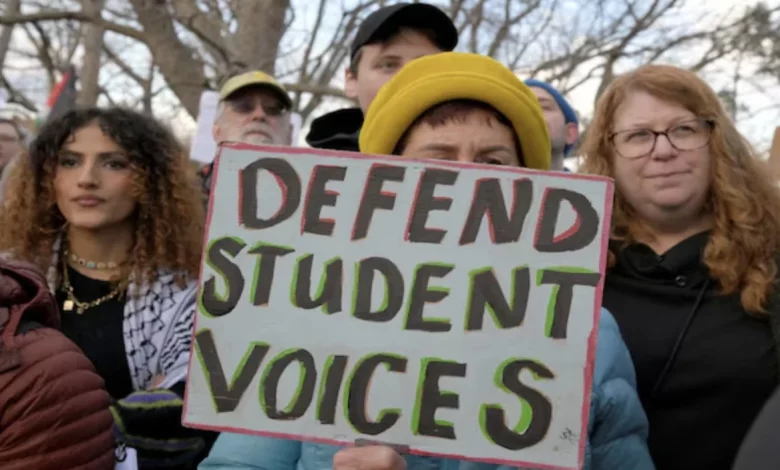Ohio State reports rising revoked visas, noting that not all international students remain in the U.S. amid stricter regulations.

In recent years, the landscape for international students studying in the United States has undergone dramatic shifts, with changing immigration policies, evolving geopolitical tensions, and institutional adjustments playing key roles. At the forefront of this issue stands Ohio State University, one of the largest public universities in the nation, which has recently reported a concerning trend: a rise in revoked visas for international students. As the number climbs, Ohio State acknowledges a hard truth—not all international students are able to remain in the U.S., a development that raises broader concerns about access to education, visa security, and the future of international academic exchange.
This development not only affects the students themselves but also has far-reaching implications for higher education institutions, local economies, research output, and cultural exchange. As the United States grapples with the balance between national security and educational openness, the story unfolding at Ohio State is emblematic of a larger national dilemma.
The Current Situation at Ohio State
Ohio State University has long been a popular destination for international students, offering world-class education, diverse academic programs, and robust support systems. At its peak, the university hosted over 7,000 international students from more than 100 countries, with particularly strong enrollments from China, India, and South Korea.
However, according to recent internal reports and administrative communications, the university has seen a noticeable increase in revoked student visas over the past two academic years. While the university did not disclose exact figures, officials confirmed the trend is significant enough to prompt concern and institutional response.
Officials cited several contributing factors to this uptick, including:
- Increased scrutiny from U.S. immigration agencies
- Delays and denials in visa processing
- Tighter regulations around online learning and work authorization
- Geopolitical tensions, especially involving China and Russia
- Students unknowingly violating the terms of their visas
University spokespersons have expressed empathy for affected students and emphasized that Ohio State is actively working with legal experts, immigration advisors, and national advocacy groups to support those impacted.
Understanding the Visa Revocation Process
To appreciate the gravity of this issue, it’s helpful to understand how visa revocation works. A student visa, such as the F-1 visa, allows international students to reside in the U.S. for the duration of their academic program, provided they maintain full-time student status and comply with visa regulations. However, visas can be revoked at any time by the U.S. Department of State or other federal agencies if a student is suspected of violating any terms—such as working without authorization, falling below the required credit load, or failing to report address changes.
In some cases, students are not immediately informed of their visa revocation and only find out when attempting to travel or renew their documents. This lack of clarity often results in confusion, missed opportunities, and disrupted academic careers.
For Ohio State students, these revocations have led to immediate challenges:
- Forced departure from the U.S.
- Interrupted degree progress
- Financial strain due to lost tuition and housing
- Visa reapplication challenges with lower approval chances
Institutional Support: What Ohio State Is Doing
To its credit, Ohio State has not stood idly by as this issue grows. The Office of International Affairs has ramped up its support initiatives, offering extended hours for immigration advising, additional legal resources, and partnerships with consular services to assist affected students.
The university is also lobbying federal lawmakers to consider reforming aspects of student visa policy. In particular, it is advocating for:
- Improved transparency in visa revocation decisions
- Grace periods for students facing sudden revocation
- More robust communication between universities and immigration authorities
- A path for reinstatement or reentry for students unfairly penalized
University President Dr. Kristina M. Johnson issued a public statement acknowledging the issue and reaffirming the institution’s commitment to its international community. “Ohio State is built on the principles of diversity, global collaboration, and academic excellence,” she wrote. “We will continue to support every member of our Buckeye family, regardless of where they come from.”
Student Stories: The Human Cost
Behind every revoked visa is a student with hopes, ambitions, and a life that has suddenly been thrown into uncertainty. For many, Ohio State was not just a school—it was a second home.
Take the case of Liang Chen, a graduate student from Beijing enrolled in the computer science program. After excelling in his coursework and landing a prestigious internship at a local tech company, Chen was informed that his visa had been revoked due to an alleged paperwork violation related to Curricular Practical Training (CPT). Despite multiple attempts to rectify the issue, he was forced to leave the country within 30 days.
“It felt like everything I worked for was just taken away,” said Chen in a phone interview. “One mistake—one misunderstanding—and my future changed overnight.”
Similarly, Sara Akintola, a Nigerian undergraduate student in biology, shared that she faced interrogation upon returning from a family visit abroad. Her visa was canceled at the airport, and she was detained overnight before being sent back home. “They said I was working without authorization, but I was just volunteering in a lab for course credit,” she said.
These stories, and many others like them, underscore the emotional and academic toll that revocation decisions are having on students and their families.
The Broader Implications
The trend at Ohio State is reflective of a broader shift across the U.S. education system. Nationwide, universities are reporting increased difficulties in international recruitment and retention due to visa instability, delays, and uncertainty.
This has significant ramifications:
- Declining international enrollment impacts tuition revenue, especially at public institutions that rely on out-of-state and international student fees.
- Reduced research output as many international students contribute to STEM research and teaching assistantships.
- Weakened global partnerships in science, medicine, and technology.
- Loss of cultural exchange, which is essential to fostering global understanding.
Higher education experts warn that the U.S. risks falling behind countries like Canada, the UK, and Australia, which have implemented more student-friendly visa and immigration policies in recent years.
“International students are not just visitors; they are contributors, innovators, and ambassadors,” said Dr. Michael Olivas, a legal scholar and immigration policy expert. “When we make it harder for them to study here, we’re cutting off a vital source of talent and goodwill.”
Calls for Reform and Future Outlook
The situation at Ohio State has reignited calls for comprehensive reform to the U.S. student visa system. Advocacy groups, including NAFSA: Association of International Educators, are urging the federal government to:
- Provide clearer guidelines for CPT/OPT work authorization
- Offer automatic grace periods after revocation notices
- Increase staffing and transparency at U.S. embassies and consulates
- Streamline visa application and reentry processes
Ohio State, along with other Big Ten universities, has joined forces to petition lawmakers for policy adjustments that protect international students’ rights while maintaining national security interests.
Despite the challenges, Ohio State remains hopeful. University administrators are working to rebuild trust with international students and their families. Virtual open houses, country-specific info sessions, and increased scholarships are just some of the steps being taken to reassure potential applicants that they will be welcomed and supported.
A Crossroads for American Higher Education
Ohio State University’s experience with rising revoked student visas is not an isolated incident—it’s a signal flare. It reflects a broader need to reassess how America treats its international student population and whether current policies are serving the goals of higher education, innovation, and diplomacy.
International students bring immense value to American campuses. They fuel research labs, diversify classrooms, and build bridges across cultures. As the United States navigates a more complex global environment, ensuring that these students can study and succeed without unnecessary barriers will be key to preserving the nation’s leadership in education and beyond.
For now, Ohio State continues to adapt, support, and advocate—one student, one case, one policy at a time. And as it does, it sends a message to international scholars everywhere: you are seen, you are valued, and your education matters.









